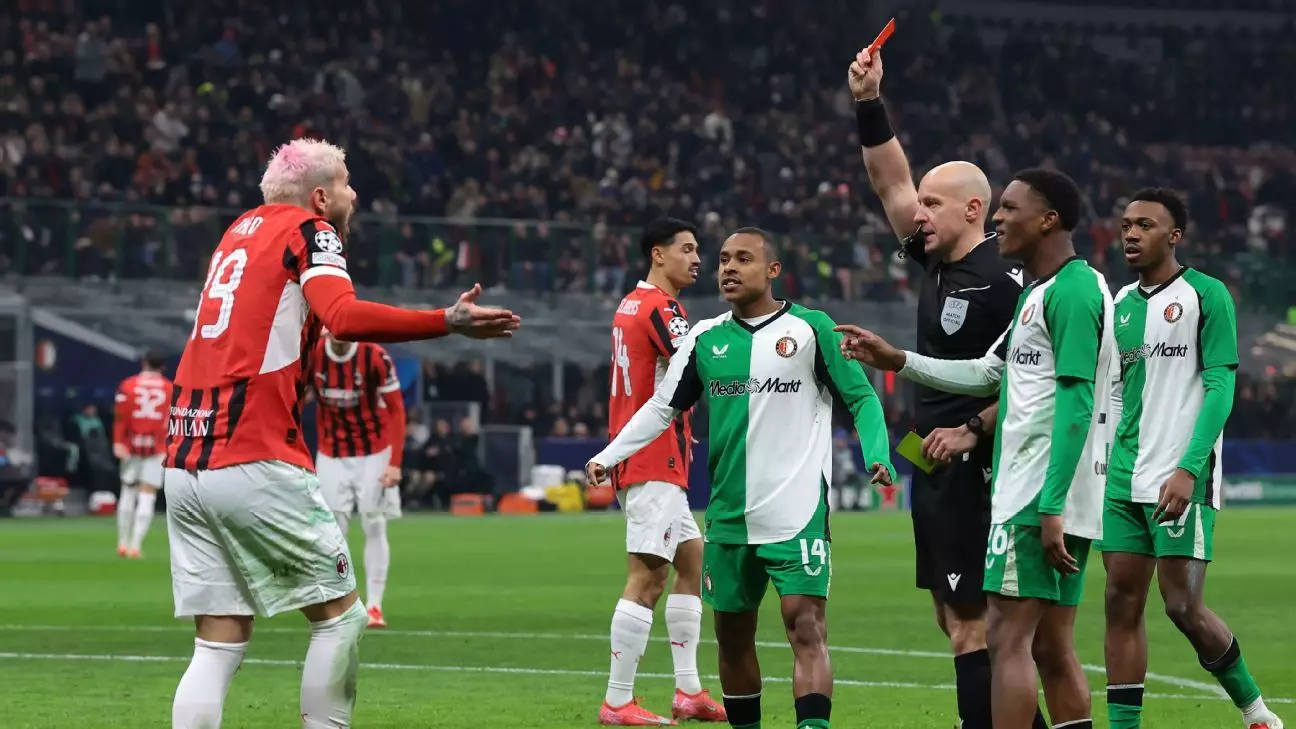In the high-stakes arena of European football, the margin for error is razor-thin. This was starkly illustrated during a recent Champions League playoff match, where AC Milan faced off against Feyenoord. A seemingly routine encounter spiraled into chaos, rooted in a shocking decision by defender Theo Hernández. Just a few minutes into the second half, Hernández’s lapse not only altered the match’s trajectory but also sealed Milan’s fate, knocking them out of the tournament. This incident exposes the intricate dynamics of player decision-making, team strategy, and the psychological underpinnings of critical sporting moments.
AC Milan entered the second leg of this playoff filled with optimism. Having lost the first match, they needed a two-goal victory to advance. The team started brightly, with new signing Santi Gimenez scoring an early goal just after kickoff, igniting hopes within the San Siro. The atmosphere was electric, particularly against the backdrop of an underwhelming Feyenoord side, plagued by injuries and managerial instability. In the first half, Milan dominated both possession and chances, seemingly on a straightforward path to clinching their place in the round of 16.
As sharp as Milan appeared in the opening exchanges, their early advantage was a double-edged sword. The temptation to take excessive risks often surfaces with teams that feel they have the upper hand. As the second half unfolded, that very temptation would lead to a disastrous outcome.
The Critical Error
The turning point came when Theo Hernández, in what can only be described as a moment of folly, chose to attempt a theatrically choreographed dive in the penalty area. This reckless maneuver resulted in a yellow card, his second of the match, and led to an immediate red card. The misguided attempt to draw a penalty was not only unnecessary but also poorly timed; Milan was controlling the game with a sense of impending victory. The fallout from this moment was staggering: an entire half left to play, and Milan was now reduced to ten men.
Hernández’s decision highlights the psychological fragility of athletes who aim to manipulate officiating rather than focusing on the task at hand. Such lapses can stem from pressure, a desire to appear clever, or a misreading of the match’s dynamics—all of which converged in this pivotal moment.
The Fallout: A Cascading Effect
After Hernández’s exit, the momentum shifted dramatically. A team once in control suddenly found itself grasping for survival. Feyenoord seized the opportunity, and with Julián Carranza equalizing the aggregate score with a goal late in the match, the tides turned irreversibly. The fear that can grip a team in transition—especially when a critical player is missing—can manifest in poor decision-making and diminishing self-belief.
Milan struggled to adapt, grappling with the implications of their predicament. Coach Sérgio Conceição’s substitutions, which included the withdrawal of key attacking players like Christian Pulisic and Santi Gimenez, seemed perplexing given the urgency required in a must-win scenario. This oversight underlined a fundamental miscalculation: a depleted squad requires resourceful decision-making rather than a conservative approach.
The aftermath of the match reflected a fracturing of responsibility within the club. While Milan officials sought to deflect blame from Hernández, it was clear that the messaging was laden with frustration. Club legend Zlatan Ibrahimović articulated this sentiment succinctly, acknowledging the severity of their collective failure, emphasizing that the players had ultimately “committed suicide” in the match.
Leadership in high-pressure situations is often tested in such moments. Conceptually, players must maintain composure and follow game plans, but they also must adapt and respond to the unfolding dynamics of the match. The inability of Milan’s players to collectively rally post-Hernández underscores a fundamental challenge in team sports: maintaining unity and discipline when faced with adversity.
In retrospect, the collapse of AC Milan serves as a poignant reminder of the stakes involved in elite competitions. The repercussions of a single player’s mental slip can extend far, impacting the collective aspirations of a team. The incident illustrates not only the importance of individual accountability but also reiterates the necessity for cohesive leadership within the squad.
As Elite football continues to evolve, teams must cultivate not just athletic prowess, but also mental resilience and strategic adaptability. For AC Milan, this defeat becomes a significant chapter where lessons should be gleaned to inform future endeavors in their pursuit of European glory. The road ahead remains laden with challenges, but emerging stronger from these crises is essential for their ambitions on the continental stage.

